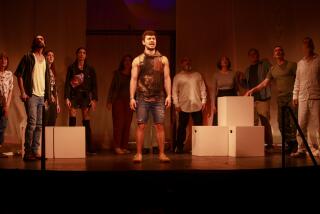Winds still shift after Shepard’s murder
The soft whistle of a passing breeze echoed through the performance space. On stage, a group of men swayed against a backdrop of Wyoming’s hills, as though they were at the mercy of the wind. They moved faintly side to side, side to side.
The image resonated throughout the Monday night performance of “The Laramie Project, Ten Years Later . . . an Epilogue” at the Eli and Edythe Broad Stage. The Gay Men’s Chorus of Los Angeles, which presented the production with Speak Theater Arts and the Broad Stage, opened the show with this rhythmic motion, symbolic of a deeper struggle.
The 2 1/2 -hour production centered on playwright-director Moises Kaufman’s return, with his Tectonic Theater Project, to the city where 21-year-old Matthew Shepard was killed by two young men 1998. Tectonic originally visited Laramie, Wyo., just after Shepard’s death, which sparked a national dialogue on gay issues and hate crimes, and conducted interviews with the townspeople. In 2008, they went back to follow up.
“It’s a story about the idea of change and the pace of change,” said Liesel Reinhart, who co-directed the Santa Monica production with Steven T. Seagle. “In California, the Prop. 8 struggle is a tug-of-war, taking us forward and taking us backward. And here’s this story of an incident that happened 11 years ago. By being a part of telling it, we push forward more. The only way for change is to keep the momentum going so you’re not pushed back.”
More than 150 theaters hosted staged readings Monday night of the play.
The Los Angeles production featured readings by Mary McDonnell, Mary McCormack, Sharon Lawrence, Bradley Whitford, Doug Spearman and Charlotte Rae.
“I just felt compelled to do my part,” McCormack said. “The ignorance toward gays dumbfounds me. . . . Prop. 8 dumbfounded me. Every time we’re on track to moving forward with change, we take one giant step back. It’s a seesaw. I remember hearing about Matthew, and his story is one many can relate to in some way. We have to keep retelling it so the changes can happen. We can’t forget.”
“The play tells the story of the viciousness and the hatred that can result when you put more weight on differences than similarities,” Whitford said. “We’re at a standstill. Look at Matthew’s story. After all these years, change is still a struggle. It’s incredibly frustrating.”
The L.A. production was the only one to blend prose with music, featuring performances by the chorus and Randi Driscoll. Music included selections by Rufus Wainwright, the Dixie Chicks, Rodgers and Hammerstein, Bob Dylan and Sons of the Pioneers.
“Music has the power to hasten the end of homophobia,” said Hywel Sims, the chorus’ executive director. “It communicates messages the way nothing else can.”
--
More to Read
The biggest entertainment stories
Get our big stories about Hollywood, film, television, music, arts, culture and more right in your inbox as soon as they publish.
You may occasionally receive promotional content from the Los Angeles Times.











